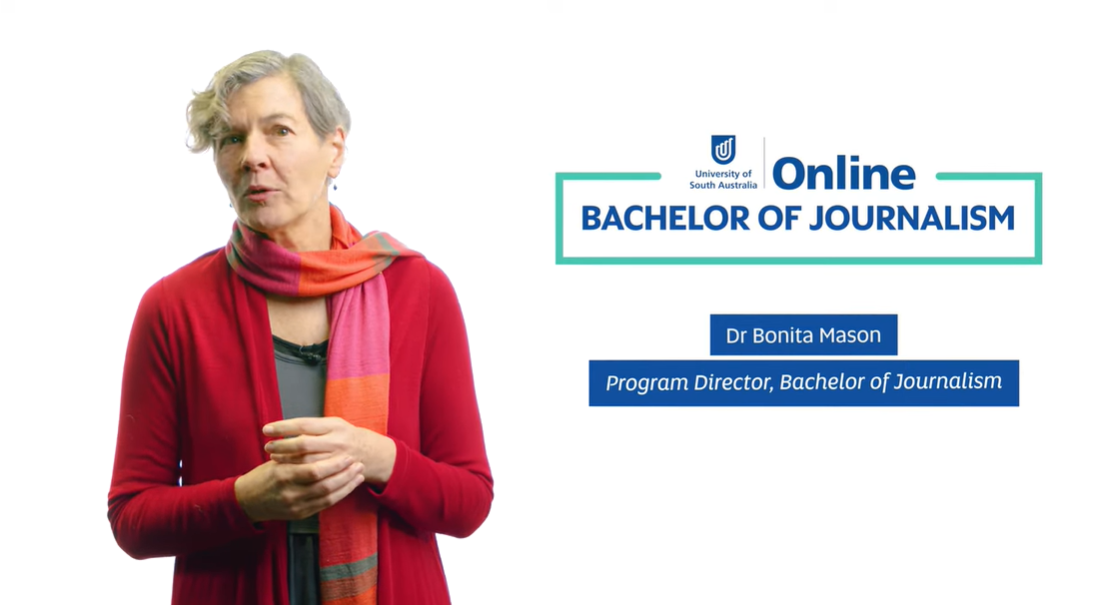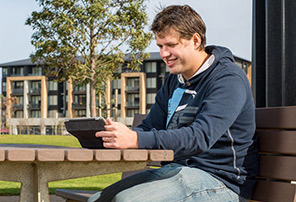You're viewing degree information for International students
You're an International student if you are:
- NOT an Australian or New Zealand citizen
- NOT an Australian Permanent Resident (including Permanent Humanitarian Visa holders)
Please remember your residency (the country you are currently in) has no impact on whether you are an Australian or International student.
UniSA Online degrees normally require international students to study outside of Australia. If you would like to study a UniSA Online degree within Australia, your visa conditions will need to allow online study. For advice on eligibility to study onshore in Australia, please contact us.
Bachelor of Journalism
Degree Level Undergraduate
Year 2025
-
View full entry requirements Hide full entry requirements
Entry requirements
Admission criteria
The admission criteria have been grouped to assist you to easily find the information most relevant to your circumstances. However, you may fit into more than one and the university will consider applicants against each of the relevant criteria.
Certain conditions apply. For more information refer to Appendix 4 of the University's Selection and Entry policy.
Applicants are required to meet one of the following criteria with a competitive result:
Higher education study
- successfully completed equivalent to a minimum of half a year of full-time study of a higher education program at a recognised higher education provider
OR
Vocational Education and Training (VET)
- Completed an award from a registered training organisation at Certificate IV level or above
OR
Work and life experience
- Passed a UniSA Online literacy and numeracy test and have relevant work experience;
- Completed a 12-month UniSA Foundation Studies program or equivalent; or
- Qualified for Special Entry
OR
Recent secondary education
- Completed a secondary education qualification equivalent to SACE, such as an interstate year 12 international qualification with a competitive selection rank (ATAR)
Essential requirements for admission
Prerequisites
NoneAssumed Knowledge
NoneEnglish language entry requirements
In addition to meeting academic entry requirements, international students who speak English as a second or additional language must also meet the University's English language entry requirements. The minimum language requirements for this program are:English language testPlease access the following link for a comprehensive list of English language tests accepted by UniSA and other important information in relation to meeting the University’s language requirements: English Language Equivalence Table (PDF)- IELTS total [6.0]
- IELTS reading [6.0]
- IELTS writing [6.0]
- IELTS speaking [6.0]
- IELTS listening [6.0]
Admission Requirements by Country
Vietnam 7 Australia 65 IB (best 6) 26 USA SAT (1600) 1050 India (best 4) State Board 70 India (best 4) Central Board 60 HKDSE 15 Nepal NEB 2.41 Bangladesh HSC 3.5 Canada High School (OSSD) 60 Eynesbury FSP 310 German Abitur 3.3 Kenya KCSE (average) B Malaysia STPM (best 3) 6 Malaysia UEC 32 Norway GPA 2.8 Pakistan HSSC 75 Sri Lanka A Levels (best 3) 6 Sweden GPA 12.5 UK Board GCE A Levels/HK Board 6
Degree overview
- Study a journalism degree that gives you the foundational knowledge and digital proficiency to work effectively across contemporary news media.
- Master essential technical and creative skills to publish compelling stories and content across a range of platforms, and learn to write, edit and design content to effectively engage diverse audiences.
- Develop an understanding of entrepreneurial journalism, and learn how to operate as an independent or freelance journalist.
- Become familiar with global media operations, intercultural communication, and the local, regional, national and international contexts within which journalists work.
- Explore specialist areas including travel writing, in-depth and social justice journalism, data visualisation, digital photography, podcasting, and digital documentary.
Snapshot

Study On Demand – this is a 100% online journalism degree designed specifically for online learning. With UniSA Online, you can take full control over your study, access support seven days a week, plan your study to fit around your life, view learning resources 24/7, and log into the interactive online environment anywhere, any time and on any device.
In this degree, you’ll combine the fundamental principles of journalism with a sound knowledge of digital platforms, enabling you to publish compelling stories and content.
Develop your audio and video production capabilities, conduct journalistic research, and showcase your abilities with an industry-ready portfolio of work.
Graduate with the knowledge and the creative and technical skills you need to report stories that people can connect with.
What you'll learn

UniSA Online’s Bachelor of Journalism combines essential journalistic knowledge and skills with digital proficiency and an entrepreneurial mindset.
You’ll learn about the role that news plays in peoples’ lives, delving into contemporary issues like the impact of media ownership, technological disruption, and reporting in the age of disinformation.
Throughout your studies, you’ll hone your critical thinking and analytical skills, build your knowledge of media law and ethics, copyright and investigative reporting practices, and build in-depth knowledge of emerging technological practices and their application in reporting, including data analysis, infographics and visual journalism.
You’ll be ready to take on the multi-platform delivery of news required of contemporary journalists and communication professionals.
Why Bachelor of Journalism

Ongoing shifts in the way people consume the news has caused widespread changes in journalism. In a world where trust in media outlets is low, disinformation is widespread, and artificial intelligence can write passable news stories, the need for verified, credible and truthful reporting, produced by skilled and ethical journalists, is more critical than ever.
This degree equips you with the knowledge and skills to empower readers and audiences, and the societies they inhabit. Throughout your studies, you’ll learn by doing – your assessments involve researching, writing, editing, and pitching stories, all of which are essential skills for a journalist. You’ll also produce an industry-standard portfolio of work as you study, so you’re ready to step straight into your career.
The blurring of boundaries between modes of media production means that journalists are often asked to prepare text, digital, and audiovisual versions of the same story. With courses focused on technological innovation, cross-platform storytelling, and disseminating news via social media, you’ll be well equipped to meet the demands of your future workplace.
Your degree has been designed and developed with leading industry experts to ensure that what you learn is practical and relevant, and is taught by academics with strong professional backgrounds and industry connections.
Your career
As social media and other online platforms enable more people to share what they think every day, the role of informed, knowledgeable, well-trained and ethical journalists in presenting truthful and accurate information in the public interest is more important than ever.
A career in journalism can lead you toward a wide variety of career opportunities, from producing stories for print or digital publications, to working in a newsroom, or as a freelance journalist.
Your journalistic skills are applicable across a range of industries, including communication, content creation, and public relations.
Careers to consider:
- Journalist: research, write, edit and produce news or feature stories for a range of publications and formats, including newspapers, magazines, TV, radio, or digital channels including social media and podcasts; write and deliver updates on news stories; conduct interviews; provide continuous coverage on breaking news and events.
- Producer: plan the way a story comes together; coordinate all elements of an audio and/or video news bulletin ready for broadcast across platforms.
- Editor: plan, revise and coordinate stories and materials for publication; review and curate story ideas; set deadlines and track performance.
- Communications officer: develop compelling content and creative concepts for a range of marketing and communication materials including email campaigns, long-form articles, style guides, social media, written scripts, and landing pages; work closely with designers, web developers, photographers, and videographers.
- Copywriter: prepare written content for a range of formats or channels, including advertising, publications, marketing materials, or websites.
- Submissions writer: research, write and develop proposals, bids, grants and tenders, including business cases, case studies and capability statements.
- Foreign correspondent: report on news and current events from an overseas location; research and write stories that highlight developing international issues and interpret for an Australian audience; contribute to commentary around international stories and events.
- Investigative journalist: undertake extensive, in-depth research, including data analysis, to uncover a previously hidden situation in the public interest.
- Documentary maker/producer: conceive, research, interview for, edit and produce feature-length non-fiction films for broadcast and streaming.
- Media adviser: provide expert advice and strategic communications to an organisation or individual; write and distribute press releases; coordinate press conferences.
- Public relations specialist: generate media coverage to help raise the profile of an organisation; deliver creative solutions and new ideas across traditional and social media; develop crisis communication strategies and manage reputation issues; and build long-term relationships with media and influencers.
Thinking of studying soon?
Industry facts
Enquire now to study with UniSA Online
Control how and when you study with our 100% online degrees.
Your study experience and support
Study On Demand
Our online career-focused degrees give you full control and ultimate flexibility over your study. It’s Study On Demand, on your schedule, on your terms.
- Designed specifically for your online learning
Designed by a team of academic and online experts, our course materials are delivered in an interactive way using innovative digital technology and state-of-the-art teaching and learning resources. - Study when it suits you
Our online degrees support students who lead busy lifestyles. With four start dates a year in January, March, July and September there is no need to interrupt your life. - Take control of your study schedule
With all content available from day one of your course, you have the power to plan your study schedule in advance. - Finish each course in 10 weeks
Our courses are delivered within 10-week terms to keep you motivated throughout your degree. Study two courses a term or just one. - 100% online study
You won’t need to come onto campus for coursework, assessments or exams. Complete all study for your degree where it suits you. - Get the help you need
Whether you need help with course content or assessments, we offer the academic support and services you need to be successful in your studies. - Adjust your study to your life
There’s no need to interrupt work and family life or spend money on travel and student accommodation. Organise study around your life. - Learn from world-renowned academics
Get a degree that’s designed and taught by leading academics and industry professionals. - 100% online interactive learning environment
Our interactive online learning environment supports all your study needs. Log in anytime, on any device, wherever it suits you. - Access a library of over 700,000 digital resources
Access a library of more than 700,000 digital resources including e-books, videos and journal articles. Our Ask the Library virtual service can help you locate, access, evaluate, use and reference a range of information resources.
IT Requirements
Generally, any desktop or laptop computer purchased in the past three years should be capable of meeting your online learning needs. While mobile devices such as tablets and smartphones will be able to access most of your online course content, there are likely to be elements of most courses where we recommend you use a desktop or laptop computer. Your computer should be able to:
- run a modern browser (Microsoft Edge, Firefox 24, Safari 5, or Chrome 32 or later versions)
- run Java
- run programs to create documents, spreadsheets and presentations
- use a web camera and headset (or ear pods with microphone)
- Some UniSA Online degrees require an online exam. The online exam software – Remote Proctor Now – has specific capability requirements. Please refer to the system requirements prior to conducting your exam to ensure your computer is compatible.
Access free IT software and resources
As a UniSA Online student, you'll:
- Get free access to the full Office 365 ProPlus suite, which includes full versions of Word, PowerPoint, Excel, Outlook, OneNote, Publisher, Access and Lync software. Install the full suite on up to five different devices (PC and Mac compatible).
- Get 1Tb of personal storage that syncs with your PC or mobile device through OneDrive - it's like an extra hard drive that allows you to open any of your files from any of your devices, whenever you need them.
- Get free access to LinkedIn Learning - Access more than 5000 video courses on a broad range of topics such as: the Microsoft Office suite, time management and study skills, health and wellbeing, communication and presentation skills, photography, film making and designing your own games or mobile apps.
- Be able to connect with others using Microsoft Teams, Yammer and the Outlook Web App.
There are some degrees that have specialised software requirements. We've made this software available to students to access for free - you'll be able to download and install any of the required programs on your own device anywhere and anytime. See if your degree requires specialised software.
Check your device
Our computer system test will determine if your device has the base system resources and software required to study online. It'll also check the speed of your internet connection.
See if your computer, laptop or device is all set up and ready to go – it takes just a few seconds.
The application process is easy – just follow these simple steps:
-
Submit an online enquiry
If you're ready to apply, the first step is to fill out and submit our online enquiry form. Here you'll be asked a series of questions to see if you're eligible. Following your online enquiry, one of our Degree Advisers will contact you at your preferred time to discuss the application process.
Enquire now > -
Speak to a Degree Adviser and start your application
If you're eligible, you'll receive an email outlining the entry requirements and the relevant documentation you need in order to be considered.
In order to verify your academic qualifications, you'll need to upload relevant documents like your official parchment, certificates or transcripts. If you have work experience, you will need to upload your CV as well as any other documents like work references, professional recognition or accreditation or your training certification.
Your email will contain information on the specific documents you need to provide as well as a link to begin your application. You'll be asked to create an account and set your own password.
-
Complete your application and send through your documents
In order to proceed with your conditional offer, you’ll need to complete your application and provide required evidence of your previous study or work experience.
Enquire now >
Alternative Pathways
- complete the UniSA College Diploma in Creative Studies (Communication)
- complete the UniSA College Undergraduate Certificate in University Studies (Creative Studies)
- complete the UniSA Online UniStart
Online Course Facilitator
-
When should I apply?
UniSA Online degrees start four times a year in January, April, June and September. There are key application dates for each term. If you're looking to apply for credit, there are different closing dates you need to be aware of, so it's always best to double check. Key dates can be found at unisaonline.edu.au/key-dates.
-
Do I have to be online at set times?
All of our courses are asynchronous, meaning you choose when to study, whenever it suits you. However, if your degree has online exams, you will need to sit these at a designated date and time. Some courses may also require you to speak to your academics via phone or online communication channels at a mutually agreed time as part of your assessment.
-
What academic support is available?
Our academics are available seven days a week, including weeknights. Throughout your degree, you’ll be supported by our highly experienced academic team of Online Course Facilitators and casual academics. Our teaching team will guide you through your learning and ensure you have an outstanding, high-quality education.
They can help you with your course materials and assessments, provide feedback on your work, assist you with referencing, and can answer any other course-specific queries.
You’ll be able to contact your academics via email, online discussion forums and live messages in the online learning environment. You can also communicate in real-time and chat face-to-face with your academics online.
If you need after-hours learning support, Studiosity is a great resource that can help you with your writing, academic language, grammar and referencing. You’ll also be able to chat online with a Studiosity online adviser.
-
How is my degree structured?
Full-time students study two courses each term. It makes earning a degree completely achievable, especially if you’re working. Your degree is delivered over four terms each year. Each term runs for ten weeks with two-week breaks in between each term.
You’ll also have the option to go part-time, or switch between the two. If you need to take a break in your study, that’s an option too. We recommend speaking to your Student Adviser who can help you update your study plan and check when your courses are offered.
-
What career prospects do I have with my university qualification?
Our degrees are designed in conjunction with industry experts, employers and professional associations, and informed by the latest developments in your field. You will graduate with in demand skills and up-to-date knowledge required by industry.
You will be studying with a university known for its employment outcomes. Your UniSA degree is more than just a piece of paper – it will prepare you to start your career, or take it to the next level. UniSA's online students have graduate employment rates well above the national average.*
UniSA Online qualifications follow the same Government Higher Education Standards Framework as our on-campus degrees. The parchment you receive at the end of your degree will be the same as any other University of South Australia student.
*UniSA External UG full-time employment rate 83% Graduate Outcomes Survey 2018
-
What are the main differences between online, on-campus and distance education?
The knowledge you gain from each mode of study is the same – it's how you get there that's different. When you study online, everything from your course material to weekly activities and assessments are fully online. You'll communicate with academic staff and students via live messages, online discussion forums and email.
Studying on campus requires students to physically come on to campus at specific times to attend lectures, tutorials and practicals. On-campus students have face-to-face contact with academics and fellow students and also communicate via email and online discussion boards.
Distance Education involves physical course material packages being sent to students, usually print based but occasionally audio or video. Communication is usually via telephone, mail and email. In today’s digital era, distance education has been superseded by online education.
More FAQs








